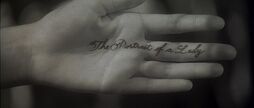When fate arranges well-planned masculine huntings for you, woman's generosity and virtue are just mistakes. Is there any alternative for women besides being appropriated by It or compromising with It? Campion empowers Isabel in her close shots of Isabel's face throughout the film. In the opening scene, the close shots exploit Isabel's passitivity as a statue. Isabel is captivated in her hopeful thinkings of the future yet she is in reality an object being gazed at both by the man and the camera.
But in the final scene. With her hands on the doorknob, the coziness and warmness at step's away, she freezes at threshold of home, domesticity, interiority and feminity, she turns around, facing the direction of the camera, the audience, the past that is full of traps. Campion examines Isabel's face with close shots, and Isabel too, examines the gaze with her eyes, the tension and indeterminancy in these shots cry out that there is no home that Isabel is obliged to return to, no man Isabel needs to partner with.
It's woman's gaze on another woman. A hindsight from 21st century to rescue Isabel. Campion did it well.
View more about The Portrait of a Lady reviews











